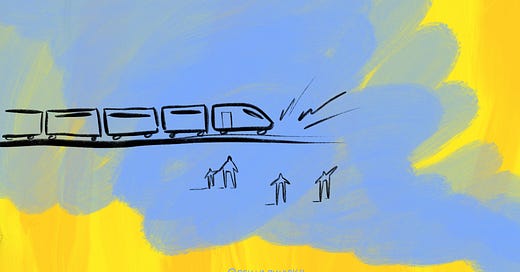The Impossible Train Story - by PHOEBE TICKELL
The Impossible Train Story is an exercise in moral imagining — a body of work developed by a growing network of storytellers, facilitators and practitioners to exercise #moralimagination
Background to the Impossible Train Story
This story was originally posted on Twitter and subsequently published on Medium, at the very start of the outbreak of the pandemic, with an invitation to join a series of emergent, experiential and experimental Moral Imagination Labs for collectively imagining life and the world after the pandemic. #MoralImaginations was described as a growing approach and body of work that serves to encourage and foster rigorous imagining for moral futures.
The world was in an impasse, a moment of crisis and paralysis, where the future suddenly disappeared from view. The Impossible Train Story came to our founder, Phoebe Tickell, as a living metaphor and mythical story that could hold the complexity of the pandemic and invite people into their imaginative agency to connect with their courage and values to create the world that comes next.
She shared it with the world and over the 6 weeks following she was joined by over 200 people globally who logged onto their Zoom accounts and took part in a series of immersive collective imagination sessions which unleashed an enormous outpouring of creativity. Later on, the Impossible Train Story was illustrated by Phoebe’s artistic collaborator and friend Reilly Dow, and turned into an animated film and facilitation tool which has now been led by 1000s of people across the world, in schools, organisations and conferences.
This early Moral Imaginations Lab took place in a unique context of the pandemic — when the present became both incredibly small and localised, and at the same time vast in its unknownness and sense of possibility of what could come next. There was a hunger and longing for escaping the current moment, but not in a way that simply distracts or numbs from reality, but actively punches through the uncertainty and fear into a new reality. The six sessions of the Pandemic MI Lab turned into a blueprint that was later developed into the Watchet Community Moral Imaginations Lab and Book, and the Camden Council Imagination Activist Training and Camden Imagines Project.
Below, you can find the transcript of the Impossible Train Story.
The Impossible Train Story - by PHOEBE TICKELL
I have a story I’d like to tell you. It’s about a train, and a group of people who live on that train and know of nothing else.
This train has been moving since anyone can remember. The people on the train can’t imagine a time when the train wasn’t moving, and when they were not on the train. Everyone works to keep the train moving. The train never stops. It never stops. It cannot stop.
People on the train live in constant churn. The work to keep the train moving is hard, and inhumane. On the train, people are treated with cruelty and oppression. Some are treated worse than others. But nobody is truly living. Sometimes they get breaks, but it is hard.
Artwork by Reilly Dow for Moral Imaginations © 2020
One day, a fire breaks out in one of the carriages of the train. There is panic. The fire spreads throughout the whole train… Without getting off the train everyone is going to die.
Then the impossible happens. The brakes no-one believed existed start to work. In the emergency, no-one notices how extraordinary it is that the train is stopping. They’re too focused on the fire. The old rules go out the window.
For years on the train, the “worker class” of people have been dying from the awful conditions of the work they have to do on the train. They sleep in the aisles and sometimes have nowhere to sleep at all.
Suddenly, there are orders to house them and treat their ailments.
The train stops, and people begin to get off. Apart from the sound of the fire, suddenly there is a great silence. The sound of the engines dies down, and the people can hear all sorts of sounds they’ve not been able to hear — birds are singing, the rustle of leaves.
The fire is unforgiving. The different carriages, which exist as different nations, are responding in different ways. Many people die, and mostly the people who have suffered most by the rules of the train.
Without the operation of the train to worry about, there is suddenly time to consider how they have been living. Why aren’t people always given places to sleep? What is the purpose of keeping the train going? Could it be different? Should we start the train again?
And suddenly they glimpse what’s ahead of the train. Not so far off, the track gives way to a cliff-edge, and a deep canyon many miles deep.
They have been hurtling toward a cliff-edge, unable to stop. The fire and disaster continues, but now they see a larger crisis.
People had spoken of this cliff-edge before, but it hadn’t made a difference. Because the train couldn’t stop, the train people would push this out of mind, unable to see a solution.
Now suddenly, some of the people got to work, ripping up the track from the ground.
Others were eager to get the train moving again. They had investments and beliefs in the train, and couldn’t face an alternative.
A great conversation began, among the carriages. The fire continued to blaze. More and more people realised it was a Life or Death situation.
The Impossible has happened. We’ve stopped the train.
🌟 How will the story end?
🌟 What is ours to do in this time?
🌟 What is there to lose?
🌟 Who do you choose to be?
🌟 And what will we sacrifice in order to build a different future?
We must write the end of the story together — using our #MoralImaginations. We will be convening a group once a week to mobilise our imaginations together —if you are interested in coming along, please send an email to hello@moralimaginations.com. It’s open to all.
#MoralImaginations is a community and practice of rigorous imagining for moral futures.
Visit our website: www.moralimaginations.com.
Like us on Facebook: www.facebook.com/moralimaginations
Follow us on Twitter: www.twitter.com/moral_imagining
Tweet with the hashtag #MoralImaginations
If you think this article is important, please make an effort to share it with your networks or invite people to join our newsletter.
Follow my work and newsletter by visiting www.phoebetickell.com/subscribe.




